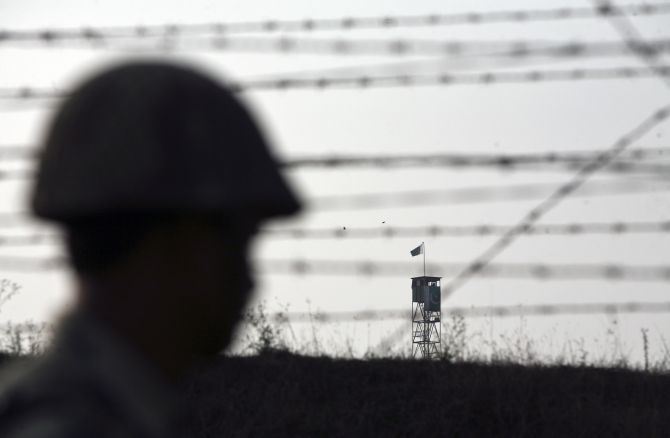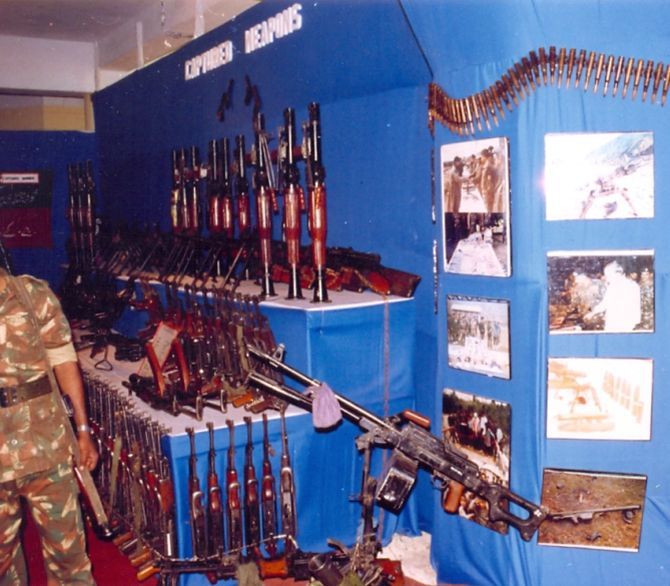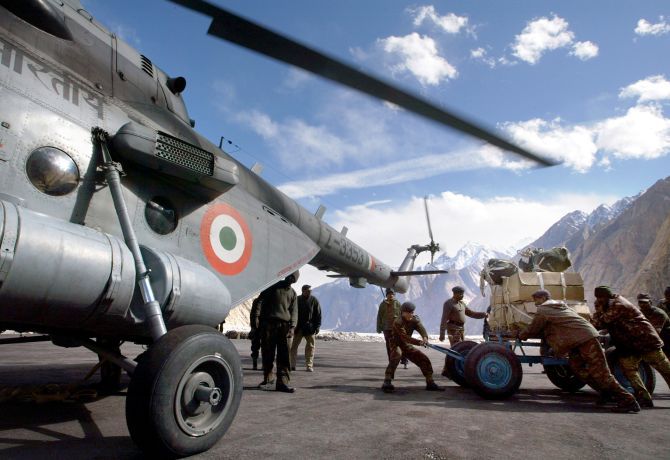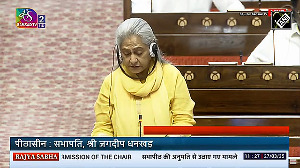
Sanjeev Nayyar offers a few suggestions on dealing with a country that has made export of terror a reason to make the world notice and fund it.
Ever since India got independence in 1947, she has fought four wars with Pakistan -- in 1947, 1965, 1971 and 1998 -- and is a victim of Pakistan-sponsored terrorism for over 30 years.
From 1981 to August 9, 2015, 21,641 people have died in terrorist related violence in Punjab (external link) while 43,792 have died in J&K (external link) from 1988 to August 9, 2015. This excludes about 750 killed in Mumbai, India's most bombed city, and other parts of India.
Successive Indian leaders have extended a hand of friendship but the Pakistani leadership has flattered to deceive.
How does one deal with a country that has made export of terror a reason to make the world notice and fund it?
Former foreign secretary J N Dixit wrote in Anatomy of a Flawed Inheritance, 'the partition of the sub-continent has its roots in Islam ethos. It goes back to the Prophet's journey from Mecca to Madina in 622 AD in face of persecution and harassment, known as Hezira, to the effect that Muslims must not live in tyranny or oppression from peoples of other faiths. They must remake their lives elsewhere in order to practice their faith'.
Dixit further wrote, 'Not getting the whole of Bengal and Punjab, Jinnah talked about having got a moth-eaten and truncated Pakistan. The genesis itself was permeated with bitterness'. Also, 'as nearly one-third of the Muslims of India stayed back, the social, cultural and linguistic connections could not be obliterated. This created a crisis of identity for Pakistan, which continues till today'.
Any nation created out of hatred for another will never be at peace with itself till the other fails. It means India's 'democratic experiment must be questioned and destroyed' because her success would defeat the reason for Pakistan's creation.
Pakistan's inability 'to organise a responsive political system, military coups, nexus between military, landed elite and business class accentuated differences in its population'. Conversely, Pakistanis see democracy firmly established in India, its accentuated economic growth since 2000 and the BCCI's hold on world cricket.
Arising from this intent, every attempt is made to derail India's nation building effort. At times, Pakistan has sought to deflect attention from its misdeeds, as it successfully did post September 11.
Read: Did Godhra save Pakistan
The first set of suggestions is about what we must do.
One, given its size, Pakistan occupies too much of media/mind space. It is also referred to in election speeches. We must benchmark ourselves against bigger economies i.e. raise the bar.
READ: The necessary art of ignoring Pakistan (external link)
Two, post May 2014, and coming after years of Congress inaction on border firing, the Bharatiya Janata Party's aggressive response drew cheers from the Border Security Force and people alike. Pakistanis were taken by surprise but the contours of the border allows them to fire at will, making leaders’ claims sound hollow and border population feel helpless. Repeated public statements have lead to one-upmanship.
Speak sparingly; let the guns talk as India's former high commissioner to Pakistan G Parthasarathy recently wrote. ‘It is often forgotten that the Indian response to infiltration, between 2000 and 2003, was so devastating that in areas like Neelum River Valley life was regularly brought to a standstill. It was this policy that forced General Musharraf to ask for a ceasefire in November 2003’, Parthasarathy said.

Three, Pakistan is trying to provoke India with repeated cross border firing and terror attacks. The game needs to be played intelligently. Hit back at a time and place of our choosing. The message that needs to be driven home is that India has the ability and political will to respond.
Four, tell the Muslim world that, by becoming a nursery of terror, Pakistan is giving Islam and Muslims worldwide a bad name.
Five, by their very nature and probably due to ahimsa as enunciated by Gandhi, the Hindu political leadership has an inherent desire for peace, forgiving nature and need to look “statesmanlike”. This needs to change.
Six, focus on becoming an economic and military power with inclusive growth. If we do so, Pakistan and China problems will get taken care of.
READ: 17 ways to take on Aggressive China
Seven, withstand pressure from the United States who pressurise us to make peace with Pakistan. An aggressive China ensures US needs us as a 'Swing State'. Defence orders for the US, worth $10 billion (63,760 crore) in the last 5-6 years, created jobs.
Eight, let Indians know that Pakistan has become a terror hub due to unstinted support from the West and China.
READ: China Pak Nuclear co-operation (external link)
Nine, peace-makers say the alternate to dialogue with Pakistan is nuclear war. That is a defeatist approach. Keep talking to Pakistan because they are like a child who sulks when ignored.
Is it time to review India's no first use of nuclear weapons policy?
READ: Come out of the nuclear closet (external link)
Ten, stop export of livestock to Pakistan that was started in 2005. This move could adversely impact Pakistan's exports of red meat that incidentally took off after 2005.
Eleven, time bound action plan for action against individuals who represent Karachi in India.
Twelve, India must utilise its entire share of waters under the 1960 Treaty.
Thirteen, India must learn to fight her own battles. The US oscillates between supporting and ignoring Pakistan.
Fourteen, we rejoiced when Kasab (Mumbai terror convict) and now Naved (Lashkar-e-Tayiba's militant) were caught saying we have proof of Pakistan's involvement in terror. Typical Indian mentality of playing by the rules when the enemy has broken all.
Fifteen, editors of Indian newspapers/channels and Bollywood producers that espouse peace with Pakistan should be sent polite mails that this policy might result in lower profits.
Sixteen, continue to aggressively pursue co-operation with other SAARC countries thereby isolating Pakistan.
Seventeen, India must continue with its humanitarian assistance and infrastructure building in Afghanistan, which has earned tremendous goodwill. Delays in construction of Parliament House by Central Public Works Department (which left former president Karzai disappointed as he wanted to inaugurate it before demitting office) and Salma Dam by National Hydroelectric Power Corporation has given India a bad name.
Eighteen, sources state that the Indian armed forces urgently need;
a. Rafale Jets 36 to begin with, night fighting sights for our entire tank fleet, air defence missiles -- Akash and Barak, tank and artillery ammunition.
b. Acquire C4ISR capabilities: Command, Control, Communication (Speed up the plan to link up all the military bases with fibre optic cablings).
Intelligence, Surveillance and Reconnaissance: Acquire a combination of assets that will allow us to peer deep inside both China and Pakistan. Mountain Artillery (requirement for over 2,000 guns of the 155 mm calibre). One Air Mobile Brigade that has capability to airlift one brigade i.e. 3,000 soldiers with all their equipment and artillery.
Air Mobility/Close Support Attack acquire over 300+ helicopters of three types: Light Cheetah replacement (surveillance, light transport, commando insertion), Medium Mi-17 type (troop and stores transport), Chinook that can carry men, material and under slung artillery.
Nineteen, make export of arms an instrument of foreign policy. Export arms to countries like Vietnam, Sri Lanka, Afghanistan, etc.
Twenty, despite Pakistan being on a high due to Chinese and American support, India must protect its national interest and not succumb to pressure.

Siachen Glacier. Photograph: Pawel Kopczynski/Reuters
Countering Pakistani propaganda;
One, condition of Muslims in India. More Muslims kill each other and die in Pakistan.
Read: Pakistan's Ahmadiyya: An 'absence of justice' (external link)
Two, status of Christians in India. Trinamool Congress MP Derek O'brien blogged about his cousins in Pakistan who converted to Islam. 'I thought of our life in India, the freedom to go to church, the freedom to practise my faith, the freedom to be myself, the freedom that my country gave its minorities.'
Read: The Obriens of India and Pakistan (external link)
Three, accession of J&K to India. J&K acceded to India by virtue of the Instrument of Accession signed by the maharaja of J&K under the Indian Independence Act 1947. The UN resolution provides that Pakistan was to withdraw its troops from the state (Mirpur, Muzzafarabad, Gilgit and Baltistan). Since Pakistan has not withdrawn its troops, India could not conduct a plebiscite.
Four, Siachen must become a zone of peace. In view of China's Depsang valley incursion and its increasing presence in Pakistan-occupied Kashmir, any demilitarisation would be a monumental folly.
Five, involvement of Hindus in the Samjauta Express blasts. The late B Raman wrote in www.southasiananalysis.org on August 7, 2010, 'According to American investigators the LeT and Al Qaeda were responsible for the Samjauta Express blast and the Harkat-ul-Jihad-al-Islami for the Mecca Masjid blast'.
Lastly, as G Parthasarathy recently wrote, ‘At the same time, measures need to taken, which need not be spelt out explicitly, to raise the costs for the Pakistani establishment, within and beyond their country's borders’.
Gilgit and Baltistan were part of J&K state that acceded to India in 1947. They rightfully belong to us.
India must focus on economic growth, be pro-active and prepared to fight a two front war, and become a messenger of global peace.











 © 2025
© 2025